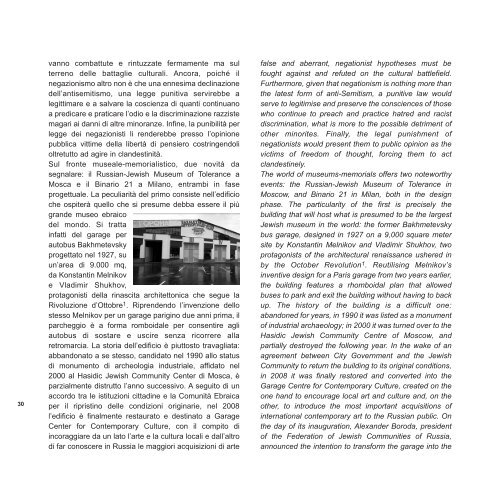Adachiara Zevi - arteinmemoria
Adachiara Zevi - arteinmemoria
Adachiara Zevi - arteinmemoria
You also want an ePaper? Increase the reach of your titles
YUMPU automatically turns print PDFs into web optimized ePapers that Google loves.
30<br />
vanno combattute e rintuzzate fermamente ma sul<br />
terreno delle battaglie culturali. Ancora, poiché il<br />
negazionismo altro non è che una ennesima declinazione<br />
dell’antisemitismo, una legge punitiva servirebbe a<br />
legittimare e a salvare la coscienza di quanti continuano<br />
a predicare e praticare l’odio e la discriminazione razziste<br />
magari ai danni di altre minoranze. Infine, la punibilità per<br />
legge dei negazionisti li renderebbe presso l’opinione<br />
pubblica vittime della libertà di pensiero costringendoli<br />
oltretutto ad agire in clandestinità.<br />
Sul fronte museale-memorialistico, due novità da<br />
segnalare: il Russian-Jewish Museum of Tolerance a<br />
Mosca e il Binario 21 a Milano, entrambi in fase<br />
progettuale. La peculiarità del primo consiste nell’edificio<br />
che ospiterà quello che si presume debba essere il più<br />
grande museo ebraico<br />
del mondo. Si tratta<br />
infatti del garage per<br />
autobus Bakhmetevsky<br />
progettato nel 1927, su<br />
un’area di 9.000 mq,<br />
da Konstantin Melnikov<br />
e Vladimir Shukhov,<br />
protagonisti della rinascita architettonica che segue la<br />
Rivoluzione d’Ottobre 1 . Riprendendo l’invenzione dello<br />
stesso Melnikov per un garage parigino due anni prima, il<br />
parcheggio è a forma romboidale per consentire agli<br />
autobus di sostare e uscire senza ricorrere alla<br />
retromarcia. La storia dell’edificio è piuttosto travagliata:<br />
abbandonato a se stesso, candidato nel 1990 allo status<br />
di monumento di archeologia industriale, affidato nel<br />
2000 al Hasidic Jewish Community Center di Mosca, è<br />
parzialmente distrutto l’anno successivo. A seguito di un<br />
accordo tra le istituzioni cittadine e la Comunità Ebraica<br />
per il ripristino delle condizioni originarie, nel 2008<br />
l’edificio è finalmente restaurato e destinato a Garage<br />
Center for Contemporary Culture, con il compito di<br />
incoraggiare da un lato l’arte e la cultura locali e dall’altro<br />
di far conoscere in Russia le maggiori acquisizioni di arte<br />
false and aberrant, negationist hypotheses must be<br />
fought against and refuted on the cultural battlefield.<br />
Furthermore, given that negationism is nothing more than<br />
the latest form of anti-Semitism, a punitive law would<br />
serve to legitimise and preserve the consciences of those<br />
who continue to preach and practice hatred and racist<br />
discrimination, what is more to the possible detriment of<br />
other minorites. Finally, the legal punishment of<br />
negationists would present them to public opinion as the<br />
victims of freedom of thought, forcing them to act<br />
clandestinely.<br />
The world of museums-memorials offers two noteworthy<br />
events: the Russian-Jewish Museum of Tolerance in<br />
Moscow, and Binario 21 in Milan, both in the design<br />
phase. The particularity of the first is precisely the<br />
building that will host what is presumed to be the largest<br />
Jewish museum in the world: the former Bakhmetevsky<br />
bus garage, designed in 1927 on a 9,000 square meter<br />
site by Konstantin Melnikov and Vladimir Shukhov, two<br />
protagonists of the architectural renaissance ushered in<br />
by the October Revolution 1 . Reutilising Melnikov’s<br />
inventive design for a Paris garage from two years earlier,<br />
the building features a rhomboidal plan that allowed<br />
buses to park and exit the building without having to back<br />
up. The history of the building is a difficult one:<br />
abandoned for years, in 1990 it was listed as a monument<br />
of industrial archaeology; in 2000 it was turned over to the<br />
Hasidic Jewish Community Centre of Moscow, and<br />
partially destroyed the following year. In the wake of an<br />
agreement between City Government and the Jewish<br />
Community to return the building to its original conditions,<br />
in 2008 it was finally restored and converted into the<br />
Garage Centre for Contemporary Culture, created on the<br />
one hand to encourage local art and culture and, on the<br />
other, to introduce the most important acquisitions of<br />
international contemporary art to the Russian public. On<br />
the day of its inauguration, Alexander Boroda, president<br />
of the Federation of Jewish Communities of Russia,<br />
announced the intention to transform the garage into the


